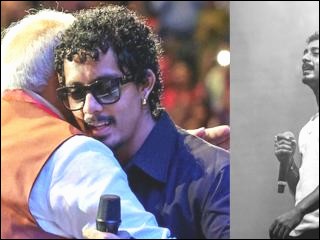In the vibrant, ever-shifting landscape of the global music scene, few narratives are as poignant and electrifying as that of Suraj Cherukat, an Indian rapper who has audaciously embraced the moniker Hanumankind. His journey transcends mere fame; it encapsulates the intricate tapestry of identity and evolution within the Indian diaspora as it boldly stakes its claim on the world stage. With his explosive track "Big Dawgs" causing seismic ripples—at one point even eclipsing Kendrick Lamar’s "Not Like Us"—Cherukat has carved out a space for himself in a genre traditionally dominated by Western voices.
Cherukat, birthed in the vibrant milieu of Malappuram, Kerala, in 1992, and seasoned amidst the eclectic rhythms of Houston, Texas, embodies a fascinating interplay of cultural influences that pulsate through his music. The gritty beats and narratives of Houston’s storied hip-hop—where DJ Screw’s syrup-drenched rhythms intertwine with the raw storytelling of UGK and the frenetic energy of Three 6 Mafia—fueled his sonic education. Yet, the rich connection to his Indian heritage has only intensified since his return to his homeland in 2021, revealing a duality that enriches his artistic expression.
While India’s hip-hop scene remains in its infancy, Hanumankind’s odyssey hints at a burgeoning potential for Indian artists to leap across local confines and enter the global consciousness. What renders Cherukat’s ascension particularly riveting is his adeptness at balancing these divergent worlds. His music, a visceral blend of forceful beats and incisive lyrics, channels the spirit of Houston while echoing the narratives of his Indian roots.
For Hanumankind, this voyage transcends music; it embodies a reclamation of self. Having been a global nomad—traversing from France to Nigeria, to Dubai—it was Houston that crystallized his passion for music. In rare moments of reflection, he remarked, "Houston has a culture all its own. It’s where I first started paying attention to the art of storytelling in hip-hop." He absorbed the essence of Southern hip-hop—the slow, codeine-infused remixes and the relentless hustle that characterizes that culture. Upon his return to India, however, his sound blossomed in new dimensions, striving to harmonize a cosmopolitan identity with his indigenous roots.
Hanumankind’s music emerges as a vivid extension of his personal saga, a cross-cultural voyage grappling with the exigencies of belonging and identity. His lyrics resonate with societal struggles in India, weaving together his overseas experiences with the stark realities of life back home. In "Big Dawgs," the iconic video that rocketed him to prominence, Cherukat performs within a maut ka kuan (well of death), a thrilling carnival challenge where daredevils defy gravity in a towering wooden pit. Shot in Malappuram, this piece serves both as homage to his roots and a bold rebuttal to the ostentatious flash often associated with mainstream hip-hop.
His choice to showcase Indian stuntmen, rather than glitzy cars or opulent lifestyles, is a conscious rebellion. "These are the real risk-takers," Cherukat articulated in one interview, underscoring that these performers hail from humble beginnings, perpetuating a dying art. Through this lens, his work becomes a resounding celebration of the underdog—the hustlers and risk-takers thriving outside conventional confines. "That’s what being a Big Dawg really means," he asserts.
The trajectory of Hanumankind’s success mirrors a broader metamorphosis within the Indian diaspora. Once relegated to traditional career paths, the progeny of Indian immigrants are now venturing into creative realms, blending their dual identities to forge novel artistic expressions. For Cherukat, the leap from a stable corporate role at Goldman Sachs to the exhilarating world of rap wasn’t merely a pursuit of passion—it was an emancipation from societal expectations. "I realized it wasn’t for me," he recounted, contemplating his departure from finance. "Music was the only thing that made sense."
Nevertheless, his acceptance in India has not been devoid of obstacles. Predominantly rapping in English, Cherukat wrestles with the challenge of resonating in a landscape where regional languages dominate the rap scene. Some critics contend that his music, while impressive, can feel detached from the nuanced Indian experience. Yet, this very tension—the push and pull of being both insider and outsider—forms the crux of Hanumankind’s artistry. "I’m not an Indian rapper, I’m a rapper from India," he muses, encapsulating his unique perspective.
Cherukat’s eclectic fusion of cultural influences—Houston’s gritty underground and India’s dynamic street life—positions him as a quintessential modern diasporic artist. His work defies categorical constraints; it ebbs and flows seamlessly between genres, languages, and narratives, asserting a compelling presence within the global hip-hop arena. His ascent is emblematic of a transformative wave of Indian talent, steadily carving out their niche on the world stage.
The resonance of Hanumankind’s recent performance at New York’s Nassau Coliseum, attended by Prime Minister Narendra Modi, marks yet another pivotal moment in his trajectory. The Prime Minister’s exuberant "Jai Hanuman" strikes a chord, highlighting the burgeoning pride in witnessing an Indian artist break through to international renown.
This evening, performed alongside global luminaries like Devi Sri Prasad and Aditya Gadhvi, radiated a clear message: Indian talent is not merely confined to local arenas; it’s receiving celebration and acclaim globally.
As the Indian diaspora flourishes, so too does the emergence of artists like Cherukat, weaving a seamless fabric of cultures and continents. In a world increasingly characterized by fluidity, Hanumankind’s music serves as a resonant blueprint for what it signifies to be an artist without borders—one whose voice is undeniably Indian yet speaks a language that resonates universally. His journey commenced in Houston, yet his message reverberates across the globe, captivating listeners far and wide.


